You must be logged in to post a review.
Advantage India
by Apj Abdul Kalam
Description:
On the way from Delhi to Jaunpur in eastern Uttar Pradesh is the dusty town of Badshahpur. Even in this nondescript settlement, people receive money via mobile transfer from family members working in distant cities. There are computer training centres offering diploma courses in Bhojpuri, Hindi and English. Here is an example of India’s numerous remote towns that have skipped the stage of basic learning and landed straight into digital literacy as they strive to keep up with the times. In his last book, A.P.J. Abdul Kalam, writing with Srijan Pal Singh, draws upon examples ranging from entrepreneurship in places like Badshahpur to a sophisticated missile programme like Agni to show how it can be ‘Advantage India’ in the final lap of the journey to 2020-the landmark year by which he had envisioned the country could transform into an economic power. How can the new initiatives-such as Make in India, Swachh Bharat, smart cities and skill development for the youth-be used to unleash the country’s vast potential? Advantage India offers the answer-a movement driven by every home and school to educate the new generation and give a fresh meaning to citizenship.
About The Author
Avul Pakir Jainulabdeen “A. P. J.” Abdul Kalam; (15 October 1931 27 July 2015) was the 11th President of India from 2002 to 2007. A career scientist turned politician, Kalam was born and raised in Rameswaram, Tamil Nadu, and studied physics and aerospace engineering. He spent the next four decades as a scientist and science administrator, mainly at the Defence Research and Development Organisation (DRDO) and Indian Space Research Organisation (ISRO) and was intimately involved in India’s civilian space programme and military missile development efforts. He thus came to be known as the Missile Man of India for his work on the development of ballistic missile and launch vehicle technology. He also played a pivotal organisational, technical, and political role in India’s Pokhran-II nuclear tests in 1998, the first since the original nuclear test by India in 1974.
Kalam was elected as the 11th President of India in 2002 with the support of both the ruling Bharatiya Janata Party and the then-opposition Indian National Congress. Widely referred to as the “People’s President,” he returned to his civilian life of education, writing and public service after a single term. He was a recipient of several prestigious awards, including the Bharat Ratna, India’s highest civilian honour.
While delivering a lecture at the Indian Institute of Management Shillong, Kalam collapsed and died from an apparent cardiac arrest on 27 July 2015, aged 83. Thousands including national-level dignitaries attended the funeral ceremony held in his hometown of Rameshwaram, where he was buried with full state honours









Reviews
There are no reviews yet.